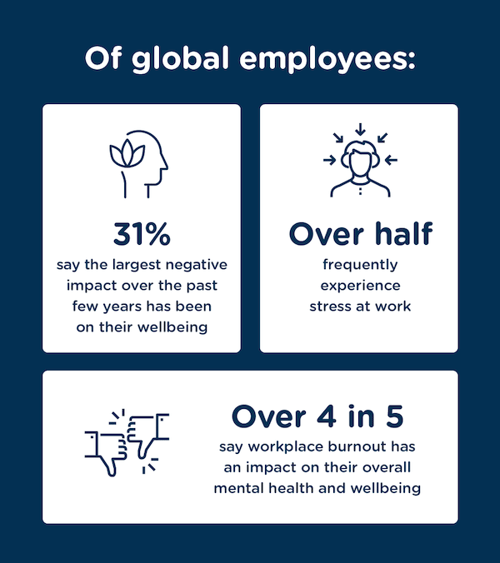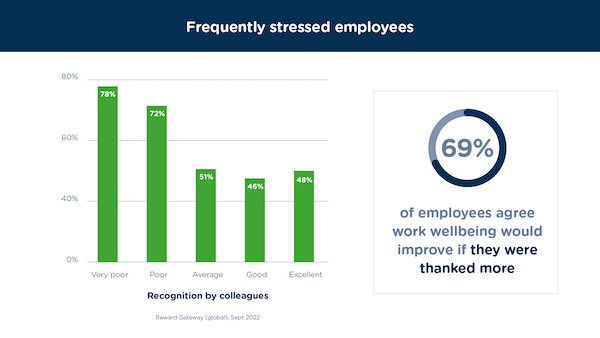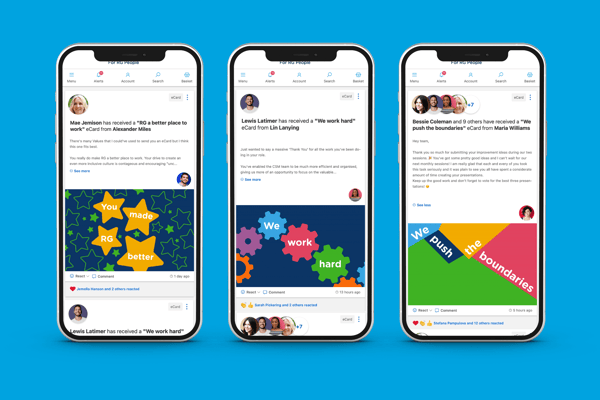Spoiler alert: People are stressed. In a recent Reward Gateway study, 69% of U.S. employees say the last few years of uncertainty and change have left them with long term effects, and more than half of employees say they are frequently or very frequently stressed. Surprising?
Maybe, maybe not. As we’ve navigated the ups and downs of the past few years, we’ve seen how workplaces build resilience, but that doesn’t negate the factors impacting day-to-day stressors, such as inflation, a rollercoaster job market and increased pressures to do more with less.
 Tackling each and every one of these stressors, among others we’ve not named, is a tall challenge. But as employers, you have a responsibility to monitor and steer what’s within your control to decrease everyday stress for your people. One of the top ways to do this is to simply show more gratitude for how hard your employees are working.
Tackling each and every one of these stressors, among others we’ve not named, is a tall challenge. But as employers, you have a responsibility to monitor and steer what’s within your control to decrease everyday stress for your people. One of the top ways to do this is to simply show more gratitude for how hard your employees are working.
Gratitude has a well-known impact on stress reduction.
Decades of studies have found the long-term benefits of building a practice of gratitude include lower cortisol levels (the stress hormone), stronger immune systems, improved communication with others – and a better mood. Who couldn’t use more of that in their lives? And people understand this connection intuitively.

In a recent Reward Gateway study, 66% of U.S. employees – see global figure below – agreed that their work wellbeing would improve if they were simply thanked more for their hard work – and that perspective is backed up by the data. For those that shared recognition from colleagues is very poor or poor, we see the percentage of people that are frequently stressed jumps up into the 70s. When we asked those that rated recognition from colleagues as good or excellent, however, that percentage fell below half. There is still stress (when isn’t there?), but recognition reduces its impact in the workplace.

Now, the twist:
When are you least likely to take a moment to share some recognition love?
When you are stressed, burned out and feeling overwhelmed.
I hear you, and I know it can be difficult to shift your own mindset, especially if you yourself are feeling the effects of burnout. But being intentional about your own recognition habits, as a leader, manager or individual contributor, is critically important to keeping employees motivated and productive.
Set aside time to take a deep breath and consider who and what you are grateful for (I bet you already feel the stress ebbing away!). Once you have one or more examples of work that has supported you, your team or your customers, make sure to celebrate that with the person and publicly. Not only will they feel appreciated, but you are actually helping their wellbeing by helping them focus on what is working – rather than what is not.
Need some inspiration? When I’m feeling a bit down or stressed, sometimes going to our own social recognition wall – what we call our Wow Wall – does the trick to put me in a better mood. Seeing the flood of great things and amazing projects my colleagues are working on reminds me why I do what I do day in and day out, and influences what I might recognize others for.
And, thanks to our new Boost feature, when I see a really exciting recognition moment, I now have permission to attach a financial reward to the eCard – right from the social wall! This allows me to really emphasize the behaviors we want to see at work and make my coworker’s day all in one easy step.
Examples of eCards on our Wow Wall

Want to get more managers focused on recognition? Check out this blog with some manager recognition examples. Looking to make a bigger splash? Employee Appreciation Day is March 3rd, so take a look at these Employee Appreciation Day ideas that have worked for our clients in the past.

%20(1).jpeg) Alexandra Powell
Alexandra Powell



